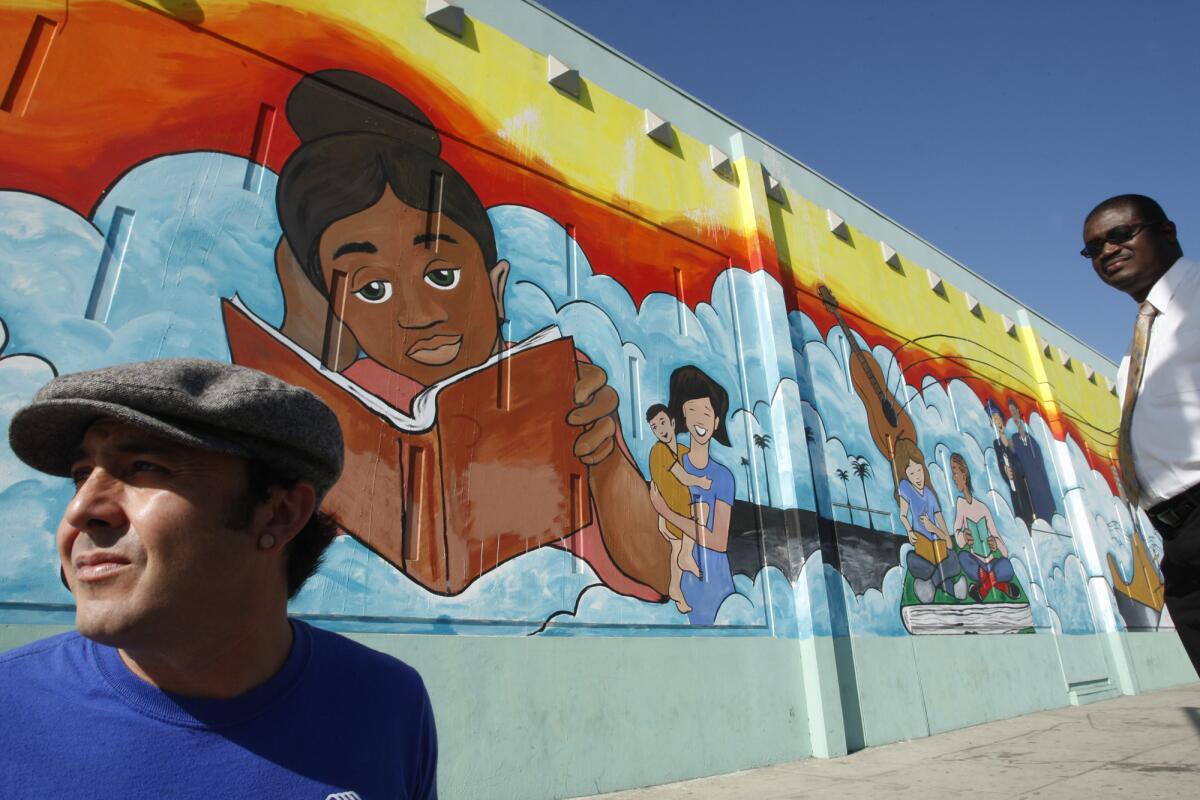Salvation Army’s Siemon center a children’s ‘oasis’ in South L.A.

- Share via
The walls of the compound stretch over an entire city block in South Los Angeles. Given the occasional gunfire in an area that’s been likened to a war zone, no one uses the doors that open onto the street in front.
But painted on the building’s facade is a bright mural of children reading, using computers and shooting hoops. They jump and play on top of a layer of heavenly clouds, untouched by the kind of graffiti tagged onto the vacant county juvenile courthouse across the street.
The summer camp at the Salvation Army’s Siemon Family Youth and Community Center has been a positive force in South L.A. for the last five years, Executive Director Mortimer Jones said. For him, that’s signified by the nonexistent marks on the building.
More than a decade ago, before the Salvation Army moved in, “this place was covered in graffiti everywhere,” Jones said of the compound. Now tagging is rare, he said, as gang members have younger siblings attending its camp. “Years ago, it was just a building on the corner of 76th and Central. And today it’s this amazing oasis.”
The Siemon Center’s annual summer day camp hosts 170 students, ages 6 to12. Parents start calling to enroll their kids as early as February, and the center is often forced to refer them to other programs because of a lack of space. Classes include art, dance, science, reading and computer programs such as Photoshop, Word and Excel, and kids are also given time for movies, basketball and video games — all for $11 per week.
“We allow the parents to go to work, and we allow the kids to be somewhere safe, whereas they would have been home or on the street,” Jones said. “And while they are here, we are providing them with a program that is still stimulating their mind.”
The cornerstone of the camp is the reading program, now in its second year. For an hour a day, each camper goes to the reading room or the library. The program is challenging but not boring, made more interesting each week with a theme such as “Animal Planet” or “Disco Days” incorporated into lessons. Students get school supplies and field trips as rewards. Throughout the process, the camp evaluates kids on their reading ability using donated iPads.
Many campers come from low-income, single-parent or foster care families. For some, English is a second language. The camp estimated that 75% of the kids start camp reading below their grade level.
“In school they feel the pressure, they have to know something,” said Sara Reyes, who runs the reading program. “Here it’s more open learning. There is no pressure. If you get it wrong, you can try again.”
Many kids didn’t have the ability to sound out words, making reading difficult, she said. Students said they were frustrated in school, and they stopped trying.
“At school, teachers pick what you read. But when you come to summer camp it’s more fun because you choose books that you like,” said camper Joseph Guardado, who will be in eighth grade this fall.
Joseph has been going to the camp for three years. When he started, he said, he picked up only short children’s books. This summer, he is reading longer works, including “Romeo and Juliet.”
“When I read a chapter book, I picture it in my head. I’m in the book, and I become the main character,” he said, in hall with a sign that read “follow your dreams.”
Guardado now uses his reading skills to help his mother, a native Spanish speaker.
The Summer Camp Campaign is part of the Los Angeles Times Family Fund, a McCormick Foundation Fund. The campaign raises contributions to support programs that provide thousands of Southern California’s at-risk children ages 7 to 17 with enriching, educational and fun camp experiences. Donations are tax-deductible as permitted by law and matched at 50 cents on the dollar. Donor information is not traded or published without permission. Donate online at latimes.com/donate or by phone at (800) 518-3975. All gifts will receive a written acknowledgment.
More to Read
The biggest entertainment stories
Get our big stories about Hollywood, film, television, music, arts, culture and more right in your inbox as soon as they publish.
You may occasionally receive promotional content from the Los Angeles Times.










